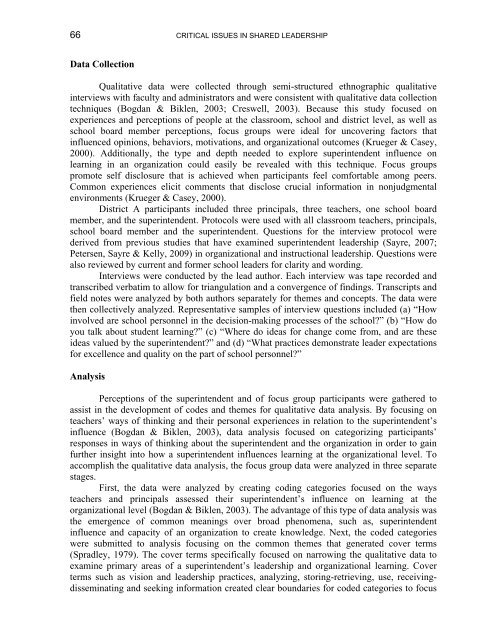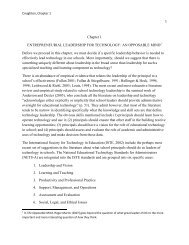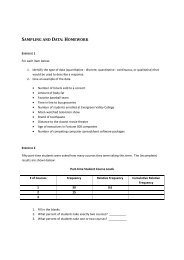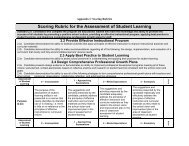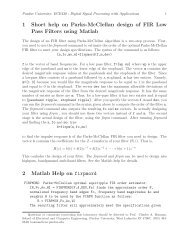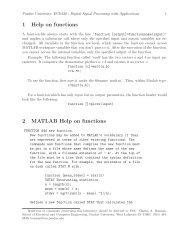Blazing New Trails - Connexions
Blazing New Trails - Connexions
Blazing New Trails - Connexions
You also want an ePaper? Increase the reach of your titles
YUMPU automatically turns print PDFs into web optimized ePapers that Google loves.
66 CRITICAL ISSUES IN SHARED LEADERSHIP<br />
Data Collection<br />
Qualitative data were collected through semi-structured ethnographic qualitative<br />
interviews with faculty and administrators and were consistent with qualitative data collection<br />
techniques (Bogdan & Biklen, 2003; Creswell, 2003). Because this study focused on<br />
experiences and perceptions of people at the classroom, school and district level, as well as<br />
school board member perceptions, focus groups were ideal for uncovering factors that<br />
influenced opinions, behaviors, motivations, and organizational outcomes (Krueger & Casey,<br />
2000). Additionally, the type and depth needed to explore superintendent influence on<br />
learning in an organization could easily be revealed with this technique. Focus groups<br />
promote self disclosure that is achieved when participants feel comfortable among peers.<br />
Common experiences elicit comments that disclose crucial information in nonjudgmental<br />
environments (Krueger & Casey, 2000).<br />
District A participants included three principals, three teachers, one school board<br />
member, and the superintendent. Protocols were used with all classroom teachers, principals,<br />
school board member and the superintendent. Questions for the interview protocol were<br />
derived from previous studies that have examined superintendent leadership (Sayre, 2007;<br />
Petersen, Sayre & Kelly, 2009) in organizational and instructional leadership. Questions were<br />
also reviewed by current and former school leaders for clarity and wording.<br />
Interviews were conducted by the lead author. Each interview was tape recorded and<br />
transcribed verbatim to allow for triangulation and a convergence of findings. Transcripts and<br />
field notes were analyzed by both authors separately for themes and concepts. The data were<br />
then collectively analyzed. Representative samples of interview questions included (a) “How<br />
involved are school personnel in the decision-making processes of the school?” (b) “How do<br />
you talk about student learning?” (c) “Where do ideas for change come from, and are these<br />
ideas valued by the superintendent?” and (d) “What practices demonstrate leader expectations<br />
for excellence and quality on the part of school personnel?”<br />
Analysis<br />
Perceptions of the superintendent and of focus group participants were gathered to<br />
assist in the development of codes and themes for qualitative data analysis. By focusing on<br />
teachers’ ways of thinking and their personal experiences in relation to the superintendent’s<br />
influence (Bogdan & Biklen, 2003), data analysis focused on categorizing participants’<br />
responses in ways of thinking about the superintendent and the organization in order to gain<br />
further insight into how a superintendent influences learning at the organizational level. To<br />
accomplish the qualitative data analysis, the focus group data were analyzed in three separate<br />
stages.<br />
First, the data were analyzed by creating coding categories focused on the ways<br />
teachers and principals assessed their superintendent’s influence on learning at the<br />
organizational level (Bogdan & Biklen, 2003). The advantage of this type of data analysis was<br />
the emergence of common meanings over broad phenomena, such as, superintendent<br />
influence and capacity of an organization to create knowledge. Next, the coded categories<br />
were submitted to analysis focusing on the common themes that generated cover terms<br />
(Spradley, 1979). The cover terms specifically focused on narrowing the qualitative data to<br />
examine primary areas of a superintendent’s leadership and organizational learning. Cover<br />
terms such as vision and leadership practices, analyzing, storing-retrieving, use, receivingdisseminating<br />
and seeking information created clear boundaries for coded categories to focus


